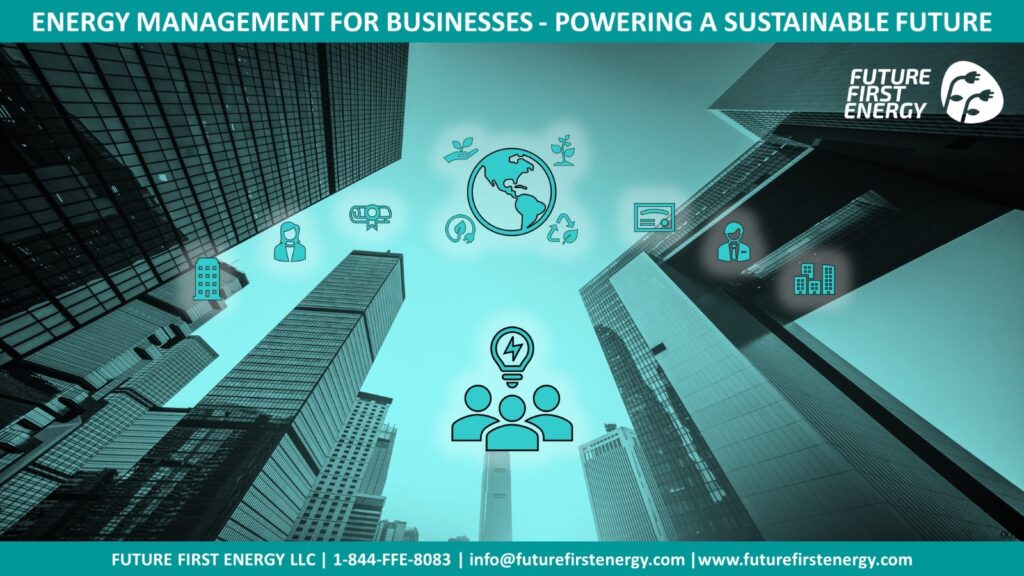Understanding Energy Management: Empowering Businesses to Thrive Sustainably
Energy management is the strategic process of efficiently using, conserving and optimizing energy resources to minimize waste and cost while maximizing productivity. It goes beyond merely cutting consumption; it’s about harnessing energy as a valuable asset. By implementing smart practices and technologies, businesses can become energy-efficient champions, reaping both financial and environmental benefits.
1. Boosting the Bottom Line: Unleashing Cost Savings
Energy costs represent a significant part of a business’s operational expenses. Efficient energy management can lead to substantial cost savings, enhancing profitability and competitiveness. 💰💹 Simple measures, such as installing LED lighting or optimizing heating, ventilation, and air conditioning (HVAC) systems, can result in immediate reductions in energy bills.
2. Embracing Sustainability: Reducing Environmental Footprint
For businesses committed to sustainability, energy management is a critical pillar. By reducing energy consumption and transitioning to renewable energy sources, businesses can dramatically decrease their carbon footprint. Taking these steps not only aligns companies with global sustainability goals but also enhances their reputation among environmentally conscious customers and stakeholders. 🌿🌍
3. Empowering Resilience: Mitigating Energy Risks
As energy prices fluctuate and the threat of supply disruptions looms, energy management offers a safeguard against market uncertainties. By diversifying energy sources and adopting energy-saving technologies, businesses can build resilience and adaptability, securing their operations in the face of challenges.
4. Fostering Innovation: Driving Technological Advancements
Energy management drives innovation by encouraging the adoption of cutting-edge technologies. From smart grids and IoT-enabled devices to advanced data analytics, these solutions optimize energy usage and pave the way for a more interconnected and sustainable future.
5. Engaging Employees: Creating a Green Culture
Energy management empowers employees to be part of the sustainability journey. By involving the workforce in energy-saving initiatives, businesses can foster a sense of ownership and pride in contributing to a greener workplace. Engaged employees are more likely to support energy-saving efforts, making the journey toward sustainability a collective endeavor.
6. Navigating Regulatory Compliance: Staying Ahead of the Game
Governments worldwide are enforcing stricter energy regulations to address climate change. Effective energy management ensures businesses remain compliant with environmental standards, reducing the risk of penalties and reputational damage.
Recognized Energy Management Programs and Certifications
In the pursuit of energy management excellence, businesses can leverage various programs and certifications to guide their sustainability journey. Some well-known programs include:
1. ISO 50001: Energy Management System Standard
The ISO 50001 certification provides a framework for businesses to establish, implement, maintain, and improve energy management systems. It helps organizations optimize energy performance, identify energy-saving opportunities, and demonstrate commitment to sustainable practices.
2. ENERGY STAR Certification
The ENERGY STAR program, run by the U.S. Environmental Protection Agency (EPA), certifies buildings and products that meet strict energy efficiency standards. Earning the ENERGY STAR certification signifies a commitment to reducing energy consumption and greenhouse gas emissions.
3. LEED (Leadership in Energy and Environmental Design)
LEED is a globally recognized green building certification program that promotes sustainable construction and design practices. Achieving LEED certification showcases a commitment to resource efficiency and environmental responsibility.
4. BREEAM (Building Research Establishment Environmental Assessment Method)
BREEAM is an internationally recognized sustainability certification for buildings. It assesses and rates the environmental, social, and economic performance of buildings, encouraging the use of energy-efficient and environmentally friendly technologies.
5. Green Building Council Certifications
Many countries have their own Green Building Councils that offer certifications for sustainable buildings and practices. Examples include the U.S. Green Building Council’s LEED and the Green Building Council of Australia’s Green Star certifications.
Embracing Energy Management: A Step Towards a Sustainable Future
As businesses embark on the path of energy management, it’s crucial to establish a clear strategy and set achievable goals. Collaborate with energy experts, conduct energy audits, and analyze energy data to identify areas for improvement. 💡🔎 Implement energy-efficient technologies, renewable energy solutions, and employee engagement initiatives to create a culture of sustainability.
Together, businesses can shape a future where economic growth and environmental stewardship go hand in hand. Embrace energy management, unlock the potential for savings and sustainability, and pave the way for a brighter, greener tomorrow. 🌞🏢
Join the energy management movement today and share your experiences and ideas in the comments below. Let’s inspire each other to create a more sustainable world. 🌱
💬 #EnergyManagement #Sustainability #RenewableEnergy #BusinessImpact
